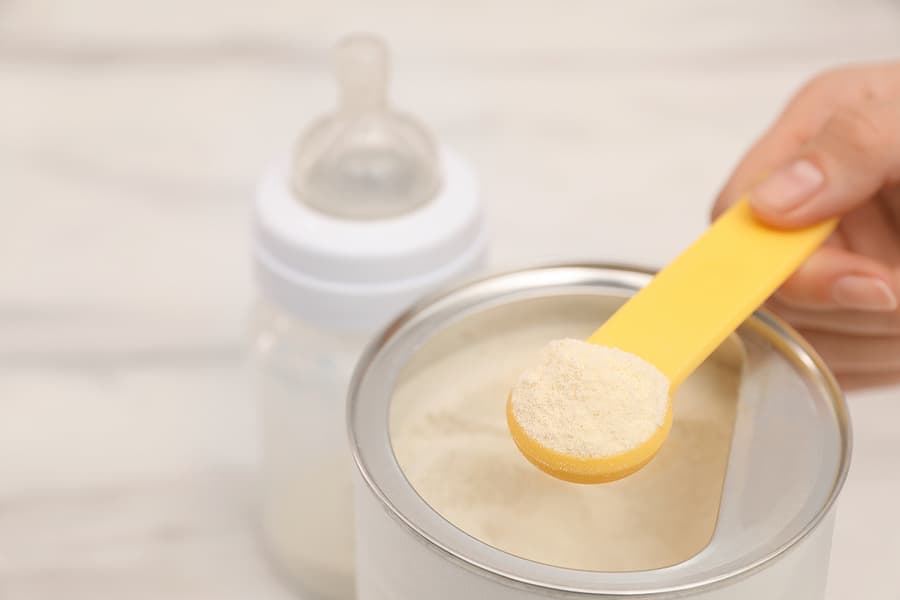NEC, or necrotizing enterocolitis, can cause severe complications for infants who may spend time in the NICU after birth. During those early days, infants need to gain weight rapidly. Many parents believe that infant formula offers the best chance of infant weight gain so they can come home as soon as possible. Unfortunately, infant formula may pose an unexpected risk: an increased risk of developing NEC.

The NEC/Similac Connection
Similac, like other popular formula brands on the market (including Enfamil, made by Mead Johnson), relies on a cow’s milk base. Since 2010, pediatricians and formula manufacturers have known that using cow’s milk-based formula increases the risk of NEC by 50 percent and the risk of surgical NEC by 90 percent.
Scientists do not entirely understand why cow’s milk-based formula increases this risk so substantially but theorize that it may occur because human milk reduces gut inflammation and protects against unwanted bacteria, while cow’s milk may not offer the same protection.
According to a study published by Breastfeed Med, human milk with added cow’s milk-based fortifier increases the infant’s risk of NEC by 4.2 times. It increases the risk of surgical NEC or death 5.1 times, compared to human milk alone.
In 2011, the Surgeon General issued a warning to formula companies noting that premature infants should receive breast milk when possible. Ideally, the breast milk should come from the infant's mother. When the mother cannot produce milk on her own or has a hard time providing enough milk to support the infant's growth and development, the Surgeon General recommends donor milk.
In 2012, the American Academy of Pediatrics backed up those recommendations, saying that "breastfeeding and human milk are the normative standards for infant feeding and nutrition."
Treatment for NEC may cost between $138,000 and $238,000 or more per case. Those costs can prove prohibitive to many families.
Similac’s Advertising Efforts: Encouraging Families to Choose Formula
Similac, like many other popular formula companies, uses its advertising efforts to encourage families to choose formula for their infants. Marketing, both on the website and in the materials often sent to new parents, claims to offer “informed choices” to parents who may have an interest in formula feeding.
False Need
Often, parents receive marketing from Similac geared toward creating a sense of need where none exists. Similac even has formula marketed specifically for preemies. Parents may find themselves encouraged to use it over breast milk because they receive the impression that it can provide better-quality nutrition for their infants, especially for fragile premature infants who need additional support to gain weight.
Parents may even feel that human milk will lead to worse outcomes for a premature infant, including less weight gain overall. However, research shows that infants fed human milk do not have increased weight gain problems, and conversely may have better overall health outcomes.
Perceived Inadequacy
Similac's website, like Enfamil's, encourages parents to seek out resources to aid with breastfeeding, but may ultimately create a sense of fear and inadequacy in parents. Young mothers, in particular, often find themselves especially vulnerable as they try to make the best possible decisions for their babies.
Website content, however, focuses on the challenges of breastfeeding, including the risk of infection, low supply, or frustration in the mother. As a result, mothers may start with a sense of fear that later translates to low supply. They may also jump to formulas as a solution for perceived problems. Similac provides free formula samples to many new mothers, which means they have that formula on hand when those moments of inadequacy occur.
Using a formula, as a result, often creates a vicious cycle. Because the baby does not spend time at the breast, the mother’s body does not produce the additional milk the baby needs. Eventually, that cycle can destroy the breastfeeding relationship between mother and child. Unfortunately, this can ultimately lead to increased risks for infant health, including the risk of developing NEC.
Inadequate Warnings for Parents
By marketing formula intended for premature infants, Similac creates the illusion that they have offered a safe, even desirable alternative to human milk. The company pushes the use of formula, with its higher calorie content, as a great solution for infants struggling to gain weight or mothers with supply issues, despite the American Academy of Pediatrics and the Surgeon General recommending that premature infants receive pasteurized donor milk, when possible, instead of formula.
These infant formula bottles contain no warnings about the potential dangers of using formula instead of human milk, including the risk of developing NEC. While Similac bottles, particularly single-serving bottles intended for use with young infants, do warn about the risk of microwaving bottles because they could cause hot spots that might scald babies, they contain no such warnings about the increased risk of developing NEC due to the use of that formula.
Thus, parents may feel a false sense of security in transitioning to cow milk-based infant formula, which may ultimately lead to serious illness and even long-term complications for their infants.
Do You Have Grounds for a Claim Against Similac?
If your infant developed NEC due to formula feeding as a premature infant, you may have grounds for a claim that can help you recover some of the funds spent on your child's treatment and funds for the suffering your child went through.
Contact an experienced NEC lawyer to learn more about your family's rights and what steps will protect your family and child after an NEC diagnosis due to formula use.